June 10, 2023 | By Magdalena Karlick, Ph.D-c, ATR-BC, LPCC
We are powerful. We push against dominant norms related to gender, sexuality, expression, love, family, and pleasure. Communities of q-wierdness offer belonging.
In true art therapist form, to support my writing of this blog, I played with art supplies to help me connect to what I wanted to say. I made collages depicting the impact of current anti-trans legislation, the complex loss related to religious trauma, and the beauty of being authentic in spite of. The symbols in these collages that stand out to me are a half-covered window, parts of faces put together, harvested butterflies, a catapult, memorial candles, and the layers of words: embracing, legacy, contents, we are not alone, and why. When issues and perspectives are complicated, I turn towards collage and layering materials. It supports my understanding of what is hidden, what overlaps, what is centered, and what is missing.
“Anatomy of Empathy”,
Magdalena Karlick, 2023
Collage on paper >
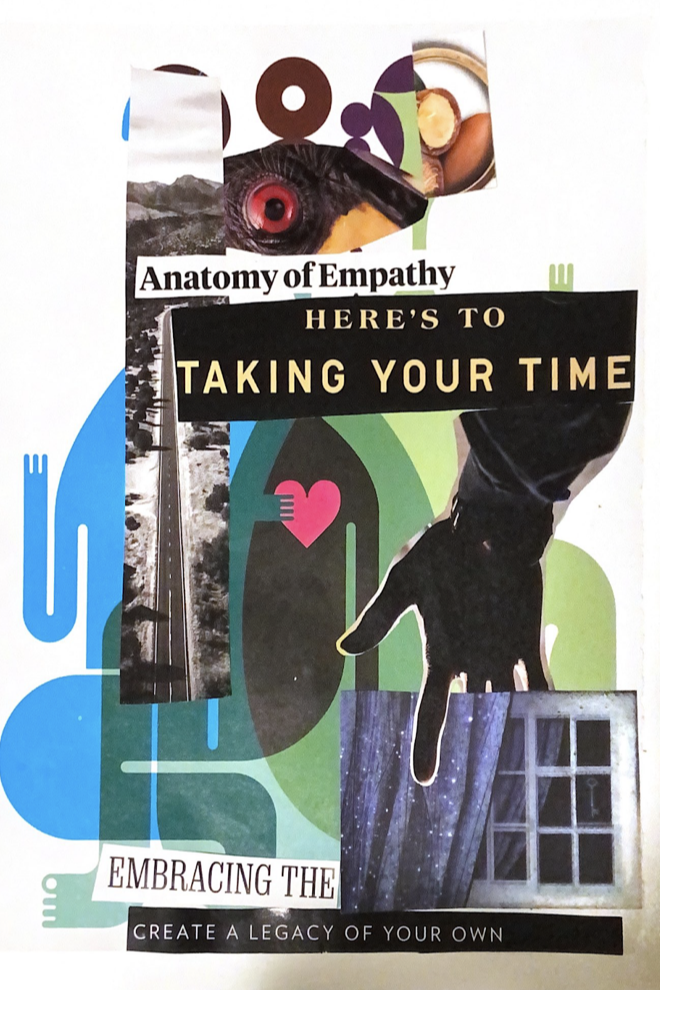
Community Care is a Fundamental Human Need
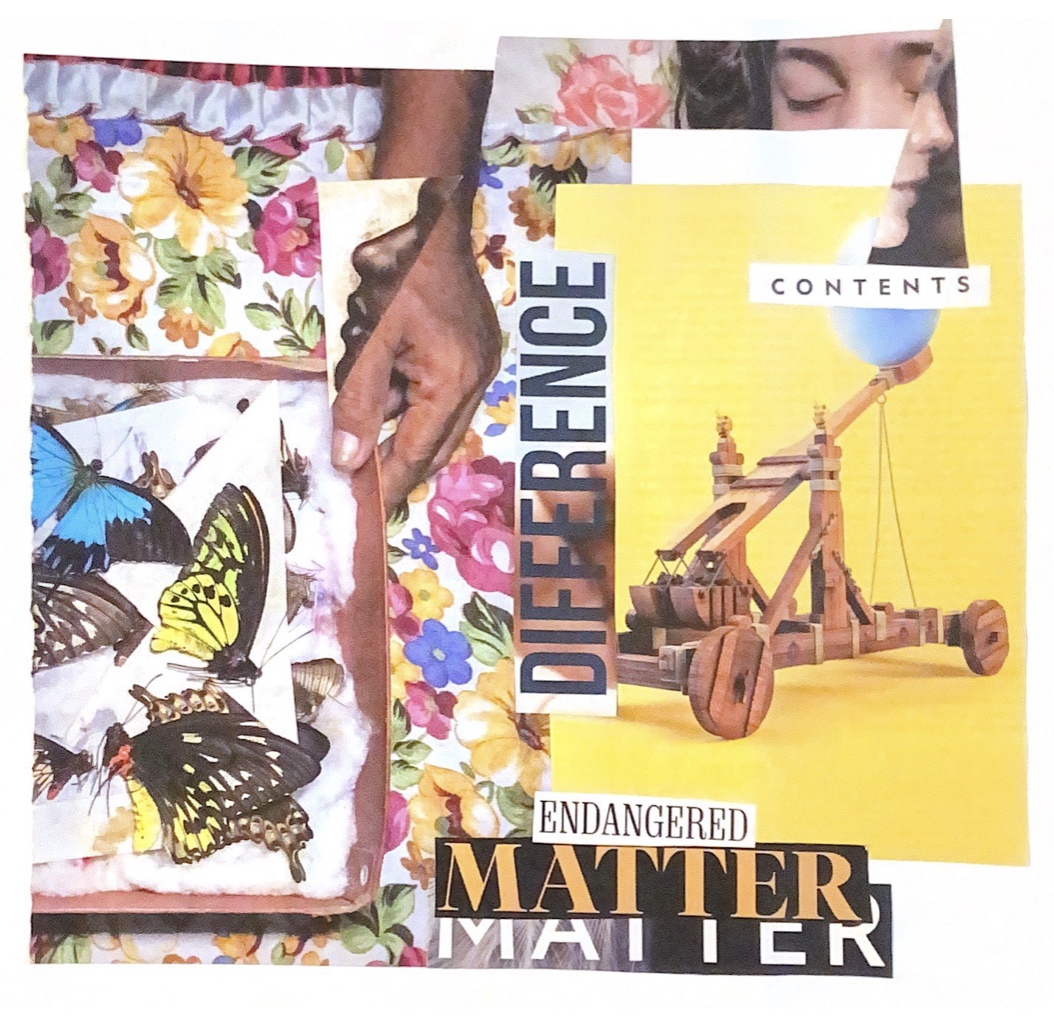
“Endangered Matter” Magdalena Karlick, 2023, Collage on paper
Community care is a fundamental human need. Thank goodness for chosen families and queer* communities. While the smallness of these communities can offer interpersonal challenges (dating and self-disclosure), there is also common language, experience, weirdness, acceptance, and celebration. The visceral sense of belonging reduces anxiety and increases the sense of being seen, being safe, and having purpose. It offers connection, guidance, mentorship, relief, and mirroring.
When queer folks lose inherited community due to dress, love, and interests it is a deep rupture. This loss is complicated. One can be both deeply hurt and feel betrayed by the family member who refuses to use their pronouns and they can also love and respect this human.
Some of my clients have experienced the loss of the religious community that they grew up in as well as family members. Mixed messages (“I love you” and “Your being is wrong”), expected conversion, direct expulsion, and outright hate and violence make these losses confusing, traumatic, and complex. Many clients are managing belief in god(s), pain of rejection, and internalized voices that deem them unworthy and sinful.
For those of you reading this, who are not queer, I trust that you can feel what it is like to be surrounded by a lack of attunement. What does a lack of attunement cause internally, if exposed to it long term?
Self-judgment.
Anxiety.
Depression.
Grief.
Despair.
Confusion.
A longing to be seen.
Suicidal ideation.
There’s a spectrum of experience amongst folks who identify under / within the LGBTQIA++ umbrella of being misunderstood, judged, harassed, abandoned, threatened, killed for being authentic and honest about who they are. The impact of these experiences can range from deep heartbreak to death.
The Impact of Anti-Trans Legislation
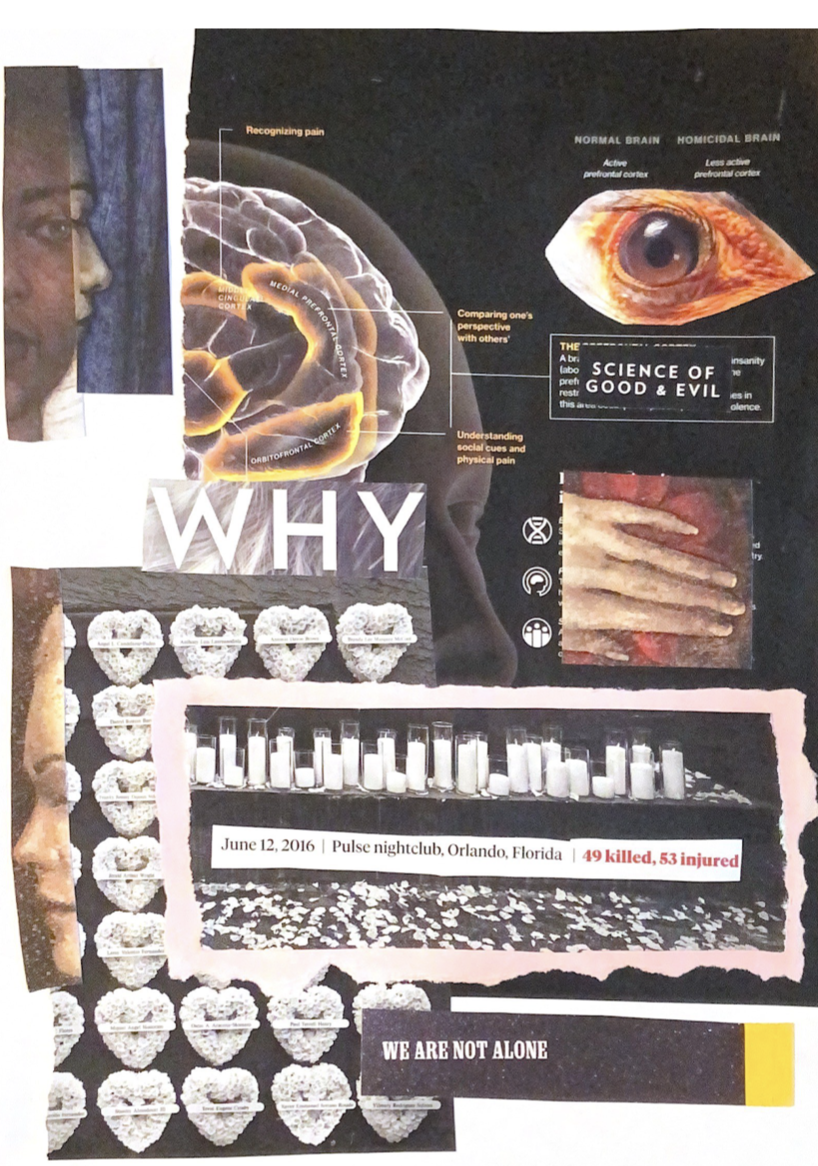
”WHY” Magdalena Karlick, 2023, Collage on paper
The current anti-trans legislation around the nation is terrifying: denial of gender affirming care with financial, legal, and familial consequences; criminalization of drag, which has ancient and cross-cultural roots; the exclusion of trans youth from sports; and the denial of changing legal documents to affirm identity.
Our queer clients are impacted by this legislation: those who reside in the states where some of this legislation has passed or have been proposed, as well as those who are concerned that their state may be next. This is not new though, as “conscience clauses” have given mental health practitioners in some states in the US the right to refuse to offer services to queer clients.
While it’s doubtful that a queer client would want to see a practitioner who is homophobic or transphobic, the reality still remains that mental health services become less accessible for queer folks. And as we all know, in the US, the intersection of marginalized identities means decreased access to health services, and increased risk factors.
Many clients are scared about the violence that could happen at Pride events this month. Some clients have experienced the rise of public discrimination as a reason to isolate.
Let’s not pathologize this fear.
What You Can Do
- If your client identifies under the queer umbrella, know that it is likely that they have experienced homophobia and micro aggressions in some form, even if it is indirect (media, family, institutions, friends).
- If your client is trans or has family members or friends that are trans, know that it is likely that the anti-trans legislation across the country is terrifying.
- Hold the knowing that your clients may be openly queer in some contexts, but not all.
- Don’t make assumptions about your client’s sexual orientation or gender identity based on their gender expression.
- Ask how your clients identify: What pronouns do they use?
- Self-correct when you make mistakes regarding assuming gender or pronouns.
- Make sure that your paperwork is inclusive. Ask for both legal name and chosen name, legal gender and actual gender, and pronouns.
- Advocate and interrupt: If you are cis-gender and heterosexual, you are much safer when you interrupt homophobic and trans-phobic rhetoric, offer another viewpoint.
Source: Magdalena Karlick, Ph.D-c, ATR-BC, LPC
*I am using the term “queer” as an umbrella term for LGBTQIA++. This term is being repurposed as an inclusive term, rather than a derogatory term. I realize that for some folk in the LGBTQIA++ community this term has yet to be accepted due to the painful history it holds.
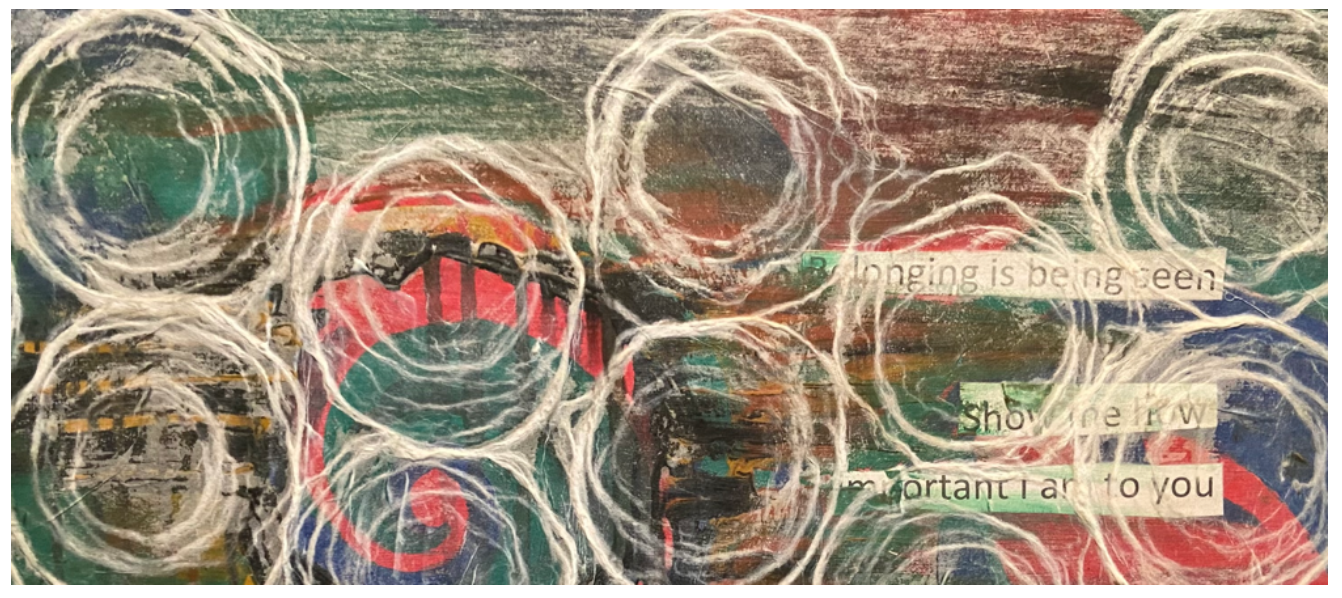
“Belonging” Magdalena Karlick 2022, paper and acrylic on canvas
“Belonging is being seen. Show me how important I am to you.” This is response art to community work that focuses on bridging relationships. It is also part of my arts-based research for my dissertation, exploring the concepts of belonging & responsibility.
A Message to AATA Members
For AATA members who identify under the LGBTQIA++ / Queer umbrellas, please join our community. Find the LGBTQIA++ / Queer Community forum – under the “Member Community” tab in MyAATA.
About Magdalena Karlick, Ph.D-c, ATR-BC, LPCC
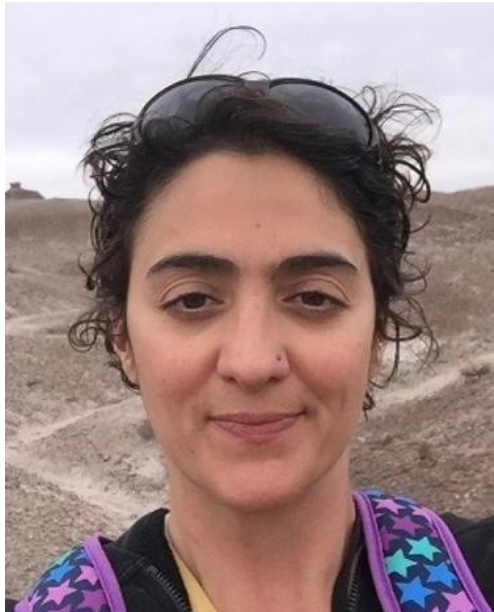
Magdalena Karlick, Ph.D-c, ATR-BC, LPCC lives in Santa Fe, NM, O’Gah P’Ogeh Owingeh, the unceded territory of Tewa-speaking people. Her private practice, “Our Imaginal World,” offers individual and group supervision, Community Health consultation, art installations, and therapeutic support.
Her new podcast “Belonging & Boundaries: An Arts-Based Approach” will launch at the end of 2023. It will feature interviews with educators in the art therapy, creative arts therapy, and expressive art therapy fields.
Magdalena is queer, of mixed heritage, and holds many privileges. For more information: www.ourimaginalworld.com
